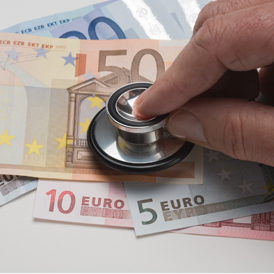EU Leaders still divided on debt crisis
 Siobhan Kennedy
Washington Correspondent
Siobhan Kennedy
Washington Correspondent
Europe’s leaders remain divided over how to respond to the debt crisis which threatens the very existence of the Euro. Three days before a summit they must agree a second bailout package for Greece.

George Osborne may not be attending Thursday’s meeting of Eurozone financial leaders in Brussels, but the Chancellor would be well-placed to keep his eyes peeled on the outcome. For the failure of Europe’s leaders to agree a second mega bailout for Greece will have potentially huge implications for us here in Britain. And as far as the markets are concerned, there’s a real fear that they could fail.
Yes our exposure to Greece is only small, but as Mervyn King, the Governor of the Bank of England, himself pointed out last month, it’s not just our direct exposure that counts. It’s our exposure to banks are themselves exposed, and their exposure to others (and so on) that poses the biggest risk. And in that regard, the truth is, no one really knows where the skeletons lie.
It’s that fear of the unknown that sparked a huge sell-off today with stock markets in London, Europe and the US all closing down.
And if there’s anything that underscores market fear more it’s the price of gold, which today reached an all-time high of $1,600 an ounce.
But it’s not the price of gold that should be worrying Mr 0sborne. Much more worrying was the steep rise in borrowing costs for Spain and Italy, which today hit euro-era highs of about 6.4 and 6 per cent respectively. And that’s significant because 7 percent is seen as the level above which other countries – like Greece – have been forced to hit the panic button and seek a bailout.
And if that happens, then Eurozone member or not, George Osborne couldn’t possibly sit on the sidelines while his European counterparts come up with a solution. And that’s because our exposure to Spanish and Italian banks – and to banks that lent to those banks who lent to others, to use Melvyn King’s analogy – is huge. Tens of billions of Euros, not the 13 billion (or less depending who you ask) often cited for Greece.
The sheer size of the Spanish and Greek economies – Spain alone is larger than the economies of Greece, Portugal and Ireland put together – would mean that any bailout on these shores would be catastrophic for Britain’s, Europe’s and the world economy.
The chancellor of course knows this but today’s hike in borrowing costs for Spain and Italy was a sobering reminder of how Europe’s crisis could overnight become another British, and global, banking crisis unless European leaders take the necessary steps this week to halt it.
No wonder Osborne issued his harshest words yet on the issue last week, at a meeting of European finance ministers that went largely unnoticed due to the unfolding crisis at Rupert Murdoch’s News International.
Speaking after Ecofin on 12 July,the Chancellor said: “The time has come for decisive action to address the crisis in the Eurozone and prevent market uncertainty doing real damage to the world economy.
“Eurozone countries should now set out in detail how they plan to expand the scale of the financial tools at their disposal, carry out credible stress tests backed up with recapitalisation for the most vulnerable banks, involve the private sector to make Greece’s debt burden more sustainable, earn fiscal credibility through concrete action to reduce excessive deficits, and push forward structural reforms to boost growth.
“The results of the action that Britain has taken are plain to see – despite having inherited one of the largest budget deficits our long-term interest rates are among the lowest in Europe. We are seen as a safe haven in the financial storm, but we are not immune to the instability on our doorstep.”
Tough words. For his sake – and the sake of the faltering British economy – he’d better hope they’re listening.




